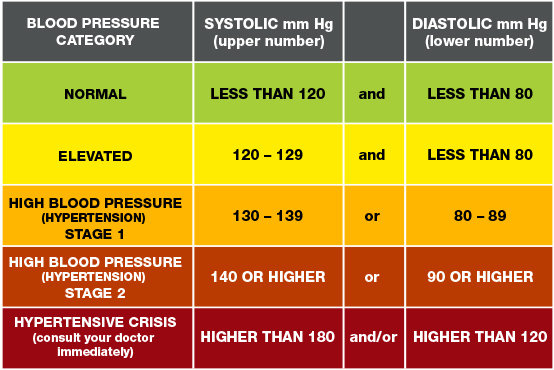Having a high-old time from hypertension
Hypertension is a medical term, also referred to as high blood pressure. Blood pressure is the force with which blood is exerted against the walls of the blood vessels. The systolic or “top number” reflects the pressure exerted when the heart beats (the heart muscle contracts and pumps blood from the chambers into the arteries), the diastolic or “bottom number” reflects the pressure remaining against the vessels when the heart rests between beats.
What causes high blood pressure? Hypertension that is not due to or linked to another condition is called primary or essential hypertension. If another cause, or underlying condition, causes the increase in blood pressure it becomes referred to as secondary hypertension. Primary hypertension can be the result of multiple factors, among those are obesity, insulin resistance, high sodium intake, excessive alcohol use, a sedentary lifestyle and smoking. Secondary hypertension has very specific causes and is a direct complication of another health condition/problem. These conditions include, but are not limited to, diabetes, pheochromocytoma (a rare cancer of the adrenal gland), Cushing’s syndrome, hyperthyroidism, hyperparathyroidism, pregnancy, sleep apnea and obesity.
There are many factors that increase the risk of high blood pressure including age (increased risk at 65+ years of age), ethnicity (with African Americans at the highest risk per studies), weight (obesity is the primary risk factor for hypertension), alcohol and tobacco use (both of these substances and the use and overuse of same lead to increased pressure of the blood vessels, as well as weakening of the same blood vessels), sex (males are much more susceptible to this disease, however the risk evens after females reach menopause), and other existing health conditions that lend to this condition include cardiovascular disease, diabetes, chronic kidney disease and high cholesterol levels.
How does an individual know they have high blood pressure, what symptoms can be expected? There are symptoms, however hypertension is known as the silent killer for a very good reason, it’s often so subtle that the symptoms are overlooked until it becomes too late. Symptoms, in severe cases, include sweating, anxiety, sleeping problems, and blushing of the face. If the hypertension becomes a hypertensive crisis headaches and nosebleeds may be experienced.
How is hypertension diagnosed? A sphygmomanometer, or blood pressure monitor, can track blood pressure and assist medical provider’s in diagnosing hypertension. However a visit to the provider is not necessary as blood pressure cuffs may be purchased over the counter, as well as machines being available at local stores/pharmacies, etc. Having high blood pressure may be a normal physiological response, for a short time and in the right circumstances (intense exercise, stressful situations, etc). However consistently high blood pressure sustained over several readings and across normal circumstances requires monitoring by a provider, with either lifestyle changes alone or in conjunction with medication necessary. Systolic readings refer to the pressure as the heart pumps blood around the body and diastolic readings refer to the pressure as the heart relaxes and refills with blood. A “normal” blood pressure range is less than 130 systolic and less than 85 diastolic with high blood pressure being diagnosed between 130-139/85-89, Grade 1 hypertension is 140-159/90-99 and Grade 2 hypertension 160 and above/100 and above. The higher numbers can lead to immediate stroke or heart attack risk, with long term risks being kidney failure, heart failure, and heart disease, compromising many body systems over the long term. This condition is, therefore, very dangerous.
To summarize a person has high blood pressure, or hypertension, when their blood pressure readings are consistently high over a period of time. The American College of Cardiology and the American Heart Association recommend that people with hypertension maintain a blood pressure below 130/80. Hypertension can increase the risk of developing a wide range of heart-related conditions (heart disease, stroke, heart attacks) and family history and lifestyle factors are often the direct cause of high blood pressure. Diet and activity changes can help to maintain a healthy blood pressure, with many medications also available to help maintain healthy numbers.
Betty Cohn is a retired registered nurse with 35 years of experience in the medical field in a variety of roles. She will write a semi-monthly column about medical-related topics and welcomes questions and suggestions at bospangle@yahoo.com.
Comments







